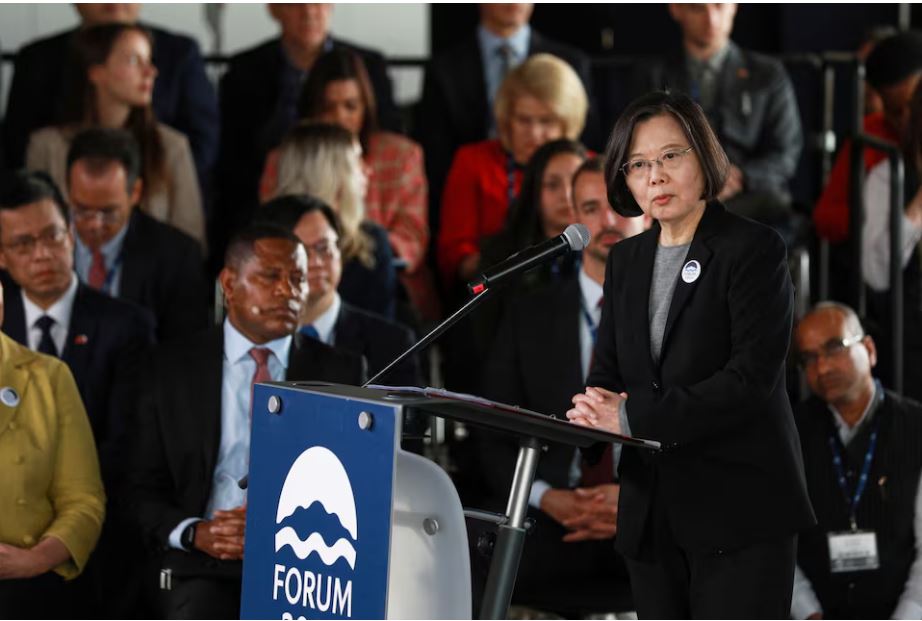Lack of prudence might be a blow to the task of building an assertive political strategy vis-à-vis China, which applies even more when we have been aware of the blatantly implemented coercive policies of China continue to challenge own Western interests.
PRAGUE: Taiwan’s Former President Tsai Ing-Wen’s visit to Prague on 13 October was an important milestone. It was her first visit since leaving her country’s supreme constitutional office that she had been democratically elected in by the Taiwanese for two consecutive terms. And it was an opportunity for her to convey Taiwan’s determination and resilience in resisting communist authoritarianism represented by its robust neighbour.
Her message was more than understood around the world. And even more so by the citizens of the first overseas country she visited. As the Czechs profoundly experienced two totalitarian systems in their daily lives throughout the 20th century – first a six-year suppression during the Nazi occupation of the country following the signature of the perfidious 1938 Munich Agreement, and later a much longer 40-year communist yoke that was one of the consequences of the 1945 Yalta Agreement, it is easy for them to draw parallels when there is a government driven by Communist ideology, as is the case in the People’s Republic of China.
Mrs Tsai Ing-Wen took part in the debates at the Forum 2000 conference. This conference was founded by the late President Vaclav Havel, a true leader of the struggle for freedom, dignity, and universally acknowledged human rights, who, even from behind prison bars, did not stop challenging the regime based on daily lies, manipulations, as well as a brutal persecution of anybody who opposed the system in any way. His struggle prevailed and allowed him and his fellows to put an end to the communist regime in his country, attaining such social and political change without employing any violence.
Mrs Tsai’s encouragement to defend Taiwan’s current social and political system based on the strict rule of law, constitutionalism, democratic values, as well as respect for human and civil rights, which was decisively demonstrated just on the soil of the conference that was established by the late President Havel, was thus quite symbolic. Although Taiwan may be seen by some of the Europeans as a remote country on the other side of the world, we cannot remain indifferent to the developments happening around it. There is no doubt that the security and prosperity in the Indo-Pacific directly affect the Euro-Atlantic area and vice versa. In short, our security and our prosperity are inextricably linked. It has already been widely accepted, as once again highlighted in the Rhodium analysis of 14 December 2022 or more recently in the CSIS study published on 10 October 2024, that any conflict in the Taiwan region would cause major disruptions to global international trade. The scale of these disruptions could have significant collateral effects on supply chains, including on Beijing’s own economic interests, given China’s central role in maritime transport.
Not only in the context of the foregoing, maintaining peace and stability across the Taiwan Strait is therefore essential to international security and prosperity, as the G7 leaders declared in their June 2024 communiqué. Yet this call is largely ignored by Xi Jinping, the Secretary General of the Chinese Communist Party, as we could see during the People’s Liberation Army’s (PLA) large-scale ‘Joint Sword-2024’ military exercises that were recently conducted around Taiwan. The intimidating military exercises were ‘successfully completed after testing joint operational capabilities, as the PRC’s officials assessed the same.The ideological and nationalist intransigence of the most powerful leader since Mao, Xi Jinping, which has been embodied in the daunting military practices of its army that result in destabilizing the region, makes Beijing particularly dangerous. We should, however, remember that threatening others with the use of military force, as the PRC has repeatedly demonstrated, could constitute a flagrant violation of the rules of the UN Charter. That is the rules to which the PRC itself voluntarily subscribed when it sought a permanent seat on the UN Security Council.
The international rules-based order is based on two pillars: the belief that everyone can be the master of its own destiny, and the acknowledgement of the universal existence of human and civil rights.
Whatever our culture, political agenda or geographical location are, we as communities can shape our future and make appropriate choices. All of us have noticed that Taiwan is a real place on the Earth with the self-governance of its own matters.
It has its own currency, its own constitution based on the separation of powers, its own laws, as well as its law enforcement agencies and armed forces. With a system in place that guarantees its sovereign citizens that their votes in free and fair elections will produce a parliament and government that are accountable to them, we have to admit that Taiwan has already been the full master of its own destiny for long. In democratically constituted countries, it is not only our duty to listen to the freely elected representatives of Taiwan, but also our honour to listen to Mrs Tsai Ing-Wen when she takes the floor and speaks on behalf of the free citizens of Taiwan. The more I interact with our colleagues in the Legislative Yuan, Taiwan’s Parliament, the more I conclude that we should not miss any opportunity
Pavel Fischer is a Senator representing Prague 17 in the Czech Parliament, where he sits as an independent. He is the Chairman of the Committee on Foreign Affairs, Defence and Security. He formerly served as the Czech Ambassador to France from 2003 to 2010, and was a presidential candidate in 2018.

